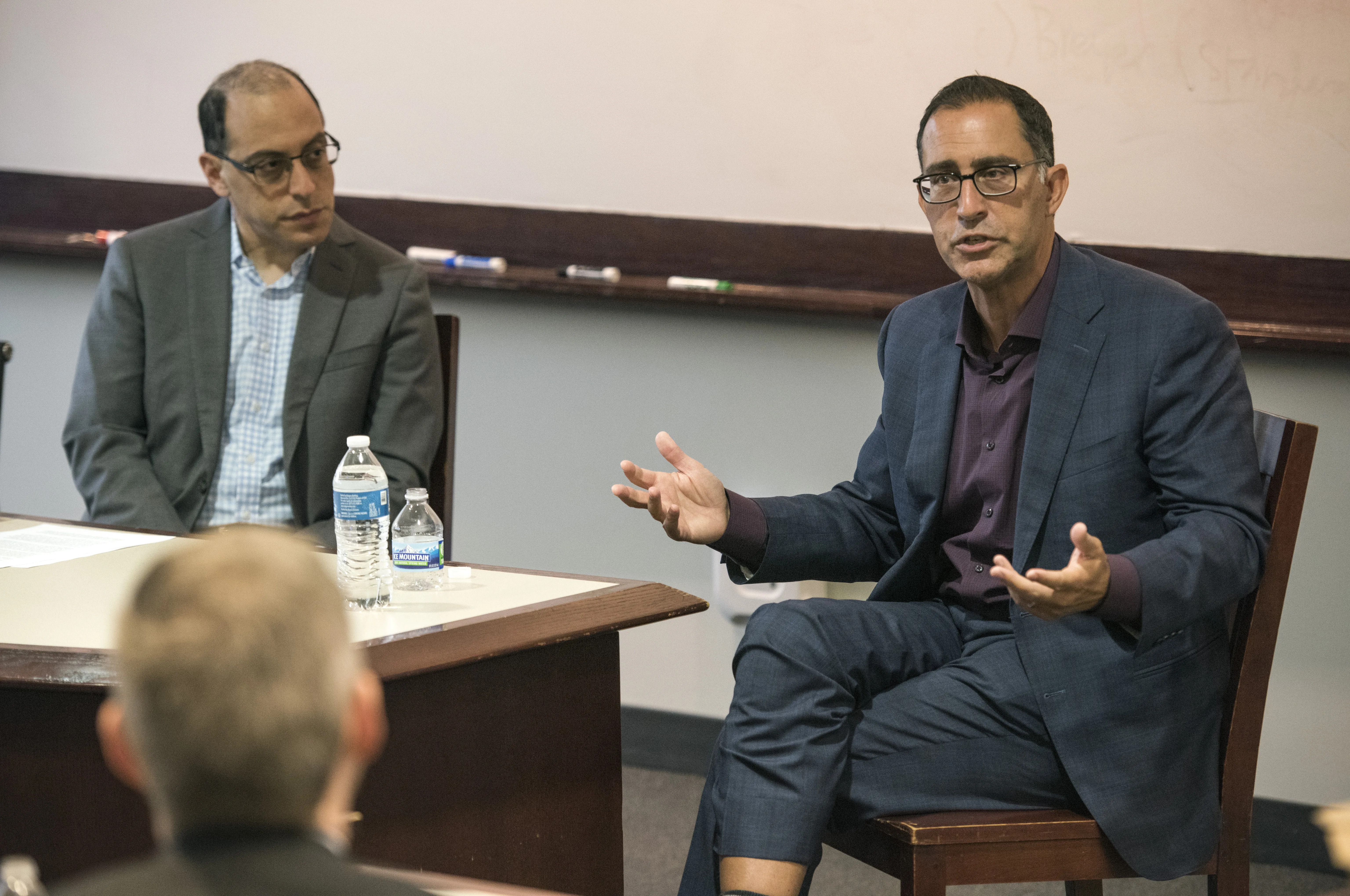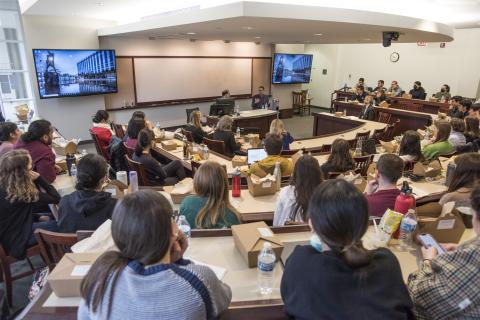In Law School Visit, Judge Vince Chhabria Tells Students How He Created His Own Path to the Bench

When he applied for clerkships as a law student, federal Judge Vince Chhabria broke what may be the cardinal rule in every law school’s career services office: he turned down both offers he received.
They just weren’t right for him, he told students during a recent talk at the University of Chicago Law School, drawing laughs as he joked that Professor Lior Strahilevitz, co-chair of the faculty clerkship committee, might be “mad at me” for offering such advice.
But Chhabria’s willingness to follow his gut led him to a career that fit his interests—though when “I said no [to those clerkships], people looked at me like I was crazy,” said Chhabria, a judge on the US District Court for the Northern District of California.
After turning down the offers, Chhabria took a job in then-President Clinton’s Office of Legal Policy, where he helped the Clinton team vet potential candidates for judicial nominations. As fate would have it, these newly confirmed judges were seeking clerks, and Chhabria applied. He found his perfect clerkship fit with Judge Charles Breyer on the US District Court for the Northern District of California.
Now, having been confirmed during the Obama administration, Chhabria works alongside his former mentor. It has been “the most special thing that’s happened in my career,” Chhabria told students during a Q&A with Strahilevitz as part of the Law School’s Edward H. Levi Distinguished Visiting Jurist Program.
Chhabria, who began his career without any judicial aspirations, consistently made his own path by recognizing that he was happiest when engaged in public policy-oriented litigation and cases that directly affected his community. After clerking and working at law firms, Chhabria thought the next logical step was to work as a prosecutor at the US Attorney’s Office. However, fate again intervened when the office took a long time to respond. While he waited, Chhabria stumbled upon an opportunity with the San Francisco City Attorney’s office, which defends city ordinances against litigation. Chhabria knew this would allow him to have a direct impact on his community, and he took the job.
“I was happy, I worked hard, it was fulfilling,” Chhabria told students. “Because I was happy, people liked me more and people were more apt to help me.”
His choices landed him on a list of potential judicial nominees during the second term of President Obama, who sought to confirm judges with experiential diversity. Obama’s team originally contacted Chhabria to ask if he was interested in an appointment to the US Court of Appeals for Ninth Circuit.
Once again, though, Chhabria followed his own path —he told Obama’s team he was more interested in a district court appointment. When he made this request, the White House lawyer in charge of judicial nominations “looked at me like I was an alien,” Chhabria said. But for Chhabria, the district court offered the opportunity that aligned with his interests.
“In the district court, you’re closer to the community, you’re making decisions more quickly, and you’re solving problems,” he told students.
His initial decisions shaped his career in other ways, too. After clerking for Charles Breyer and then for Judge James R. Browning of the US Court of Appeals for the Ninth Circuit, Chhabria also clerked for Supreme Court Justice Stephen Breyer, Charles Breyer’s older brother. In discussing Justice Breyer’s legacy, Chhabria emphasized his commitment to hiring diverse clerks. Chhabria believes it stems from Breyer’s view that “diversity of various types will bring you a diversity of views, and that can only benefit you.”
The legal profession is benefiting from Breyer’s commitment to diversity, as Supreme Court clerkships launch young lawyers into the highest echelons of the profession. Chhabria pointed to two former Breyer clerks as examples: Supreme Court Justice-designate Ketanji Brown Jackson and former Acting US Solicitor General Neal Katyal.
Chhabria is also committed to diversity in clerkship hires, employing a version of football’s “Rooney Rule.” Chhabria explained that he doesn’t fill a clerkship position without interviewing a racially diverse candidate and a candidate from a non-“T-14” law school. Like Breyer, Chhabria believes experiential diversity from all aspects of life benefits judges in thinking about the law in different and interesting ways.
“I think people who work regular-person jobs bring a lot to the table in a profession like ours and understand how people work, so I decided to institute that,” he said.
But, he added, institutional good faith must extend beyond diverse hiring practices. The legal institution “is only as good as the people and the culture that operate in the institution,” he said.
In fact, Chhabria most recently questioned the health of the United States’ legal institutions after the leak of Supreme Court Justice Samuel Alito’s draft opinion in the controversial abortion case Dobbs v. Jackson Women’s Health Association.
Chhabria said he worries that instead of operating in good faith, some contemporary public servants are motivated by self-interest that could lead to a deterioration in the profession. The leak, he said, felt like “learning of a death.”
Chhabria suggested that presuming public servants are operating in good faith and incentivizing non-partisan public service, rooted in law, offers an opportunity for reform.
At the same time, Chhabria believes judges have an important role to play in upholding the legal institution. Not only can they promote diverse hiring practices, public service, and non-partisanship, they also have a loud voice that affects a larger discussion about our institution and democracy.
“I think judges should be aware that what they are doing is part of a larger public debate and dealing with issues that affect our democracy,” he said. “We should be thinking about how we can contribute to the discussion.”
Chhabria’s personal experiences and reflections on the Dobbs leak resonated deeply with listeners.
“Judge Chhabria’s thoughtfulness and humility came through in the stories he shared about his career path,” said Nicole Kofman, ’24. “Hearing about his experiences was an aspiring reminder of the public service career possibilities that we may seek in the future.”
